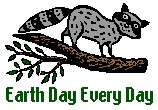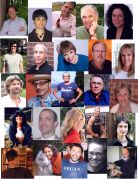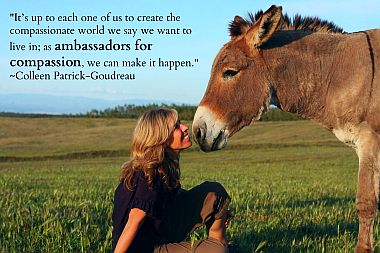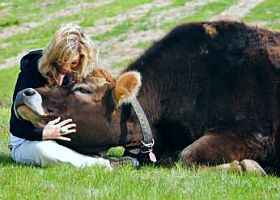Going Veg
EVEN
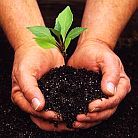
Non-violence
Compassion
Sustainability
All Life is
Interconnected
Eugene Veg Education Network (EVEN) - serving as a vegan resource since 2005
Veg Wisdom
Standing up for the things you believe in is critical, but this can be done with compassion. Educate yourself, put yourself in the other person's shoes and be grateful for every day. – Fran Costigan

Read EVEN's exclusive interview with Fran
Here.
Veg Wisdom
In the final analysis, despite our diversity, there is only one type of vegan -- a person who is committed to and practices a reverence and respect for all life. - Jo Stepaniak

Read EVEN's exclusive interview with Jo Here.
Veg Wisdom
What I call "the compassionate diet" is an opportunity to actualize a more humane, peaceful lifestyle that honors the myriad sentient beings that share our unique planet. Like us, they too wish to live out their natural life spans. - Arran Stephens, Founder, CEO, Nature's Path; Author, The Compassionate Diet
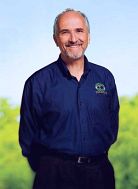
Veg Spotlight

Barbara - Long-term EVEN Member and Volunteer
Veg Wisdom
Nonviolence leads to the highest ethics, which is the goal of all evolution. Until we stop harming all other living beings, we are still savages. - Thomas Edison (1847-1931)
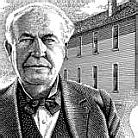
Veg Wisdom
Thou shall not kill. - 10 Commandments (God's Holy Standards) and first of Five Precepts (Buddhist code of ethics).
... the Bible does not simply say, 'Do not kill the human being.' It says broadly, 'Thou shalt not kill.'... why do you interpret this to suit your own convenience? - Srila Prabhupada

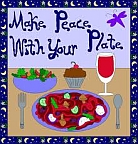
Veg Wisdom
Becoming a vegan is a sure way of completely avoiding participation in the abuse of farmed animals. Vegans are a living demonstration of the fact that we do not need to exploit animals for food. - Peter Singer

Veg Wisdom
I was brought up on an organic farm in the countryside and the whole family was vegetarian....For me, vegetarianism is based on ethics. It's how I was brought up. My mum was very vocal and we were all educated to understand why we weren't eating meat. - Stella McCartney

EVEN Featured In:
~ Vegan Voices
(Beyond Joy)
~ Health Science Magazine (Member Spotlight)
~ Boomer News Interview (NW Boomer and Senior News)
~ 24 Carrot Award (Vegetarians in Paradise)
~ Vegan Awareness Year (Mayoral Proclamation, City of Eugene)
~ American Vegan Magazine (American Vegan Society)
~ Volunteer of the Year (United Way)
Veg Wisdom
Ideas are powerful things. And the insight that other species are beings like ourselves ---different but not inferior, and that they deserve to be treated with consideration and respect--- is an idea whose time has come. – Gary Kowalski

Read EVEN's exclusive interview with Gary
Here.
Veg Wisdom
Slowly in our European thought comes the notion that ethics has not only to do with mankind but with the animal creation as well. This begins with St. Francis of Assisi. The explanation which applies only to man must be given up. Thus we shall arrive at saying that ethics is reverence of all life. - Albert Schweitzer [Religion, p. 1521]
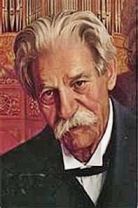
Veg Wisdom
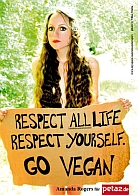
Amanda Rogers, singer, songwriter, musician, (on behalf of PETA)
Veg Wisdom
It's far more important to know what person the disease has than what disease the person has. - Hippocrates (460 BC - 370? BC)
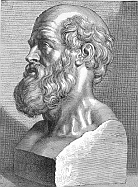
Veg Wisdom
The wild, cruel beast is not behind the bars of the cage. He is in front of it. - Axel Munthe, Swedish Physician, Psychiatrist and Writer (1857-1949)

Veg Spotlight
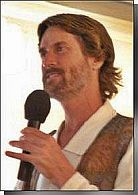
There is nothing inherently difficult in veganism – it's easy, natural, healthy, delicious, and is a win-win for everyone involved. - Will Tuttle
Read EVEN's exclusive interview with Will HERE.
Going Veg > What Is Vegan?
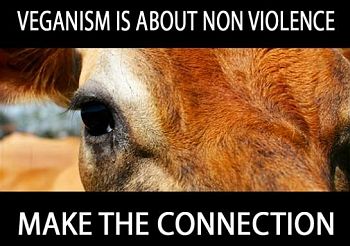
The word 'veganism' denotes a philosophy and way of living which seeks to end the idea of animals as property and exclude all forms of intentional exploitation of, use of, and cruelty to, animals for food, clothing, research or any other purpose; and by extension, promotes the development and use of animal-free alternatives for the benefit of animals, including people and the environment.
In dietary terms it denotes the practice of dispensing with all products derived wholly or partly from animals.
Source: British Vegan Society, 2004
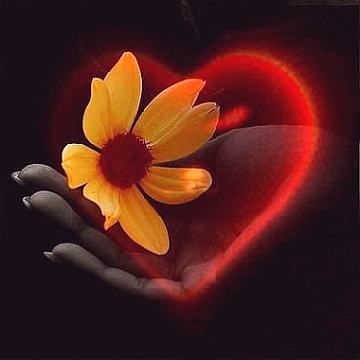
The most important thing anyone can do is to become vegan and to educate others about why taking animals seriously means being vegan. As more and more people become vegan, demand drops and consciousness about the immoral and unjustifiable nature of animal use is raised. I regard veganism as the most important form of activism for nonhuman animals. Veganism is the principle of abolition applied to the life of the individual.
- Gary Francione, Lawyer, Professor, and Author
Vegan History
 The term "vegan" was coined by Donald Watson (1910-2005) in 1944 and he defined it as follows:
The term "vegan" was coined by Donald Watson (1910-2005) in 1944 and he defined it as follows:
"Veganism is a way of living which excludes all forms of exploitation of, and cruelty to, the animal kingdom, and includes a reverence for life. It applies to the practice of living on the products of the plant kingdom to the exclusion of flesh, fish, fowl, eggs, honey, animal milk and its derivatives, and encourages the use of alternatives for all commodities derived wholly or in part from animals".
Read more vegan history here at the American Vegan Society.
What is Veganism?
Veganism is a way of life which embodies kindness, generosity and respect for each other, the planet and all living things. Veganism denotes a philosophy and way of living which seeks to exclude-as far as practical and possible-all forms of exploitation of and cruelty to, animals for food, clothing or any other purpose; and by extension, promotes the development and use of animal-free alternatives for the benefit of humans, animals and the environment.
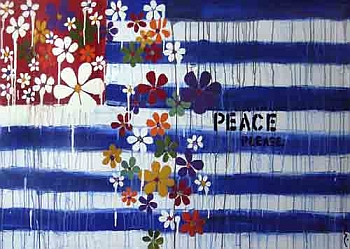
What is Ahimsa?
Ahimsa is a Sanskrit word for non-killing and non-harming. It is not mere passiveness, but a positive method of meeting the dilemmas and decisions of daily life. 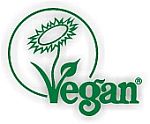 In the western world, it is called Dynamic Harmlessness.
In the western world, it is called Dynamic Harmlessness.
The six pillars of this dynamic philosophy for modern life (one for each letter: A-H-I-M-S-A) are:
A -bstinence from animal products
H -armlessness with reverence for life
I -ntegrity of thought, word, and deed
M -astery over oneself
S -ervice to humanity, nature, and creation
A -dvancement of understanding and truth
Thank you, Jay Dinshah! (1933-2000)
Jay Dinshah - Founder and President of the American Vegan Society
Ahimsa is explained in detail in American Vegan Magazine Volume 41, Number 4, page 19.
Visit www.americanvegan.org
Vegan Action
![]()
What is a VEGAN? A vegan (pronounced VEE-gun) is someone who, for various reasons, chooses to avoid using or consuming animal products. While vegetarians choose not to use flesh foods, vegans also avoid dairy and eggs, as well as fur, leather, wool, down, and cosmetics or chemical products tested on animals.
Why VEGAN? Veganism, the natural extension of vegetarianism, is an integral component of a cruelty-free lifestyle. Living vegan provides numerous benefits to animals' lives, to the environment, and to our own health-through a healthy diet and lifestyle.
Vegan Action's website does a wonderful and thorough job of breaking down "Why Vegan?" into its For the Animals, For the Environment, For Our Health categories.
Read more >> HERE
Veg Wisdom
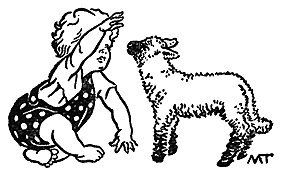
To my mind the life of a lamb is no less precious than that of a human being. I should be unwilling to take the life of a lamb for the sake of the human body. I hold that, the more helpless a creature, the more entitled it is to the protection by man from the cruelty of man.
- Mohandas Gandhi (1869-1948)
Veganism in a Nutshell
Veganism in a Nutshell
by Bruce Friedrich, PETA
There are probably as many reasons to be a vegan as there are vegans. The five we hear most often at PETA are human rights, the environment, human health, animal welfare, and animal rights. I'll address them each in a moment, but first, let me tell you why I became a vegan.
In 1987, during my first year of college, I read Frances Moore Lappés book Diet for a Small Planet. Basically, Lappé argues that cycling grains, soy, and corn through animals so that we can eat their flesh or consume their milk and eggs is vastly inefficient, environmentally destructive, and contributes to poverty and starvation in the developing world.
After reading Lappé, I wondered how I could claim to care about the environment, how I could claim to care about global poverty, if I kept eating meat, dairy products, and eggs.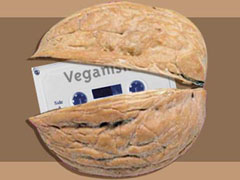 It also occurred to me that animals are made of the same stuff as humans—flesh and blood, and that they suffer just as we do. I grew up in Minnesota and Oklahoma, and it always saddened me to see trucks loaded with turkeys, chickens, pigs, or cows driving through the bitter Minnesota winter or the sweltering, arid Oklahoma summer, taking the animals, through all weather extremes, to what I knew would be a gruesome death. Taken together, the arguments were simply overwhelming. I decided to become a vegan.
It also occurred to me that animals are made of the same stuff as humans—flesh and blood, and that they suffer just as we do. I grew up in Minnesota and Oklahoma, and it always saddened me to see trucks loaded with turkeys, chickens, pigs, or cows driving through the bitter Minnesota winter or the sweltering, arid Oklahoma summer, taking the animals, through all weather extremes, to what I knew would be a gruesome death. Taken together, the arguments were simply overwhelming. I decided to become a vegan.
Back to those top five reasons we hear for going vegan: A vegan diet is, without a doubt, the best choice for our health, the only sustainable choice for the environment, and the only choice that expresses in a positive manner who we are in the world—compassionate people, compassionate toward people and toward animals.
From www.goveg.com/veganism_health.asp
Why Veganism?
What is a Vegan?
Vegetarians do not eat meat, fish, or poultry. Vegans, in addition to being vegetarian, do not use other animal products and by-products such as eggs, dairy products, honey, leather, fur, silk, wool, cosmetics, and soaps derived from animal products.
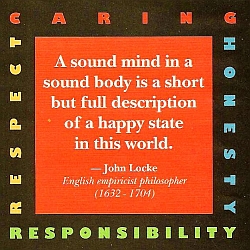 Why Veganism?
Why Veganism?
People choose to be vegan for health, environmental, and/or ethical reasons. For example, some vegans feel that one promotes the meat industry by consuming eggs and dairy products. That is, once dairy cows or egg-laying chickens are too old to be productive, they are often sold as meat; and since male calves do not produce milk, they usually are raised for veal or other products. Some people avoid these items because of conditions associated with their production.
Many vegans choose this lifestyle to promote a more humane and caring world. They know they are not perfect, but believe they have a responsibility to try to do their best, while not being judgmental of others.
www.vrg.org/nutshell/vegan.htm#what
Don't Do Nothing Because You Can't Do Everything!
Don't do nothing because you can't do everything!
Each step will bring you closer
to the person you really want to be,
and to the animals you really want to help.
 "[People may expect] it to happen all at once — that if they aren't perfect, sirens will go off, fingers will be pointed and they'll be accused of being hypocrites. Let me assuage the fears of those who think the vegan police will be knocking on their doors. That's not going to happen. That's not what being vegan is about.
>>READ MORE
"[People may expect] it to happen all at once — that if they aren't perfect, sirens will go off, fingers will be pointed and they'll be accused of being hypocrites. Let me assuage the fears of those who think the vegan police will be knocking on their doors. That's not going to happen. That's not what being vegan is about.
>>READ MORE
